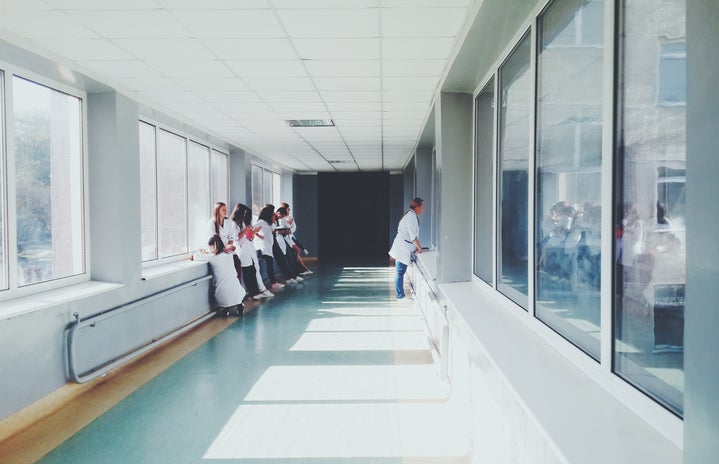Currently, I sit here cozy with a black lab pushing me closer to the edge of the bed, white flannel surrounding me, and a faint rain pattering through my open window. What normally would be a relaxing spring break day writing in my room is dampened by nerves and constant news of the worsening state of the recent COVID-19 outbreak. If there was no virus, I would be on my first day of tour with the University Singers, something I had been looking forward to all year, yet here we are handling the conditions the best we can. However, even with the current state, something that we all shouldn’t be quick to overlook are the opportunities that were cut short due to the outbreak.
We are all in the same position – we all had our lives changed last week and as we continue to practice social distancing, let’s all appreciate the staff of the University of Maine Volunteer Ambulance Corps who dedicated their year to the welfare of the University community and ironically, whose careers were cut short due to the pandemic.
Although bittersweet, I had both pitched and planned on writing this article before the cancellation of in-person classes for the remainder of this Spring 2020 semester and the following evacuation of the University of Maine campus post that announcement. On the morning of Wednesday, March 11th, all was good in Orono, Maine – besides the known spread of the Coronavirus (as it’s more commonly referred to as) through much of the United States, it wasn’t affecting Maine locally so I had no doubts that life would go on as normal.
As I normally would, I walked from my class to Cutler Health Center on campus smiling and waving at friends passing by. I was headed to interview Jake Baumann, the current Chief of UVAC (The University Volunteer Ambulance Crew). Jake is much like a brother to me as he’s been dating my sister since high school and his work at UVAC has always been of interest to me. He is one person I look up to and I decided to write this article on UVAC because I know how much this program means to people involved in it as well as the services they provide voluntarily for the University of Maine community and surrounding areas. The University is beyond lucky to have such an amazing staff of dedicated health care providers who take time out of their lives to do something they love that is beneficial to the community. First responders have a special place in my heart because I have grown up with a father involved in the emergency medical and fire services in my hometown, and who has actually worked alongside Jake Baumann at the Falmouth Fire Department.
Sleeping one room away from my parents growing up, I could hear my dad’s radio go off in the wee hours of the morning. I heard him creak out of bed and stumble to the closet where he put on his work boots and quickly ran down the stairs. The door would slam and the car engine would speed away from my house in the direction of the fire department. Most times I was able to go right back to bed knowing that someone probably burned toast which had subsequently set off a fire alarm, but after two serious fires in my hometown, this normal morning routine occurrence became less easy to sleep through. It was the morning after those nights, I’d walk through my parents’ room to make sure my dad was safe in his bed, sometimes he’d be there – other mornings he wouldn’t. He was always safe, as fire departments take extreme precautions when on duty and prioritize the safety of their fellow first responders, but it always made me think of how important these men and women are. They willingly put their lives on the line or they wake up at odd hours and inconvenience themselves to help others. Along with working for the University Volunteer Ambulance Crew, many of the members also double in their roles as a majority of them work as EMTs or firefighters for various fire departments around the Orono area or in their hometowns. Jake Baumann shares he “works for Falmouth Fire-EMS and Cape Elizabeth Fire-Rescue. I’ve worked at Falmouth for five years and I am in my second year at Cape Elizabeth. I work as a firefighter/EMT at those, but here I only participate in the EMS side of things.”
As I sat in Chief Baumann’s office, radio chiming on and off, occasional knocks on the door from staff asking Jake questions, I interviewed Jake about his experience. He shared the mission of UVAC, saying that they are the “Emergency medical services for campus, we are 911 for those on campus. Basically, what the ambulance does in Orono we do here.. our mission is to provide the best patient care we can to our specific population (University of Maine Community) and the best patient care to anyone requiring medical care. We are a regular transporting ambulance service with two ambulances.” The University Volunteer Ambulance Corps is obviously very busy, attending all the calls on campus, anywhere from a fall at the New Balance Student Recreation Center to smoke alarms going off in the library.
During the eight to nine months they are in service, this student-run ambulance service responds to around four hundred and fifty calls. They respond using their great array of emergency vehicles, including two transporting ambulances and a support vehicle. One thing that makes UVAC stand out is that it is the only transporting collegiate EMS in the entire state of Maine. It’s able to keep itself running fluidly by maintaining a large staff of sixty-five volunteers, the general member must put in a minimum of twenty-four hours a month and an officer must clock twenty-four hours a week. Although this program is primarily volunteer work, officers get paid for a certain amount of hours and event coverage of games (football, hockey, basketball etc.) is also paid.
The University Volunteer Ambulance Corps goes through a hiring process twice every school year, once at the beginning of the fall semester and again starting at the beginning of the spring semester. Contrary to what you might think, one doesn’t need EMT experience or licensing to join but you do need it if you are looking to provide patient care. To attain your EMT license in the state of Maine, you must take a semester-long course equivalent to five and half credit hours if they are transferred from Eastern Maine Community College. At the end of the course, you have to pass a practical and a written exam and then you are certified. At UVAC, twenty people out of the sixty-five members have their EMT license. There are things non-certified members are able to do, these being the opportunity to be taught how to drive the ambulance via an emergency vehicle operator course (a course that runs for two days) and after the completion of this course, you are trained on the ambulance. Along with being a driver a non-EMT member additionally has the opportunity to be a third on the ambulance and observe patient care. Overall this program can be very informative for someone who aspires to go into a healthcare position and is a way for one to get their foot in the door with patient care in a way that takes you outside of the classroom. Paired with the personal opportunities that UVAC and these positions offer, it is also vital to stress the importance of the community service they are offering .
Not only are the members of UVAC helping the surrounding community, but they are their own community themselves. When asked “What will you take away from your experience at UVAC?” Chief Baumann responded with “the camaraderie.” It was simply put, because he could not describe the extent of the community he has within the brick walls of UVACs quarters, their training rooms, offices, bunkrooms and beyond the walls of Cutler Health Center. Jake shared that “I’d say it’s one of the main reasons I picked to come to the University of Maine, and one of the main reasons I’m still at the university. So it’s been a good run. I could have gone to a number of places for college, I applied to ten schools, but this was my deciding factor. It’s been beneficial for my character and keeps me out of trouble and gives me something to do that is beneficial to the community. This year has offered me a significant leadership opportunity, being chief of UVAC. At such a young age it’s hard to come by leadership opportunities like this.” This place is so important for so many people and has shaped the members into the strong leaders and pertinent community members they are today.
Unfortunately about an hour after I interviewed Jake for this article, the University of Maine was informed that their school year was over and that we would be switching to online classes due to the risk presented by COVID-19. With the lack of students on campus, the University Volunteer Ambulance Corps ended its 2019-2020 run that Friday. Chief Baumann is a graduating senior of the University of Maine and those last two days were his final on duty at UVAC. Many members of UVAC experienced their final days last week without even knowing it and their service to the community and power and desire to help the public was shortened with hardly any notice. Many members hopped on the ambulance not knowing it was their last call and many members hung out with their crew laughing and eating take out, not knowing that it might be the last time they spent with these people. Yet even with some graduating seniors’ careers cut short and other members having to say goodbye to each other for the remainder of the school year, all of the members will leave the University Volunteer Ambulance Corps as a better person with a strong work ethic and established friendships that have forged bonds like no other.


